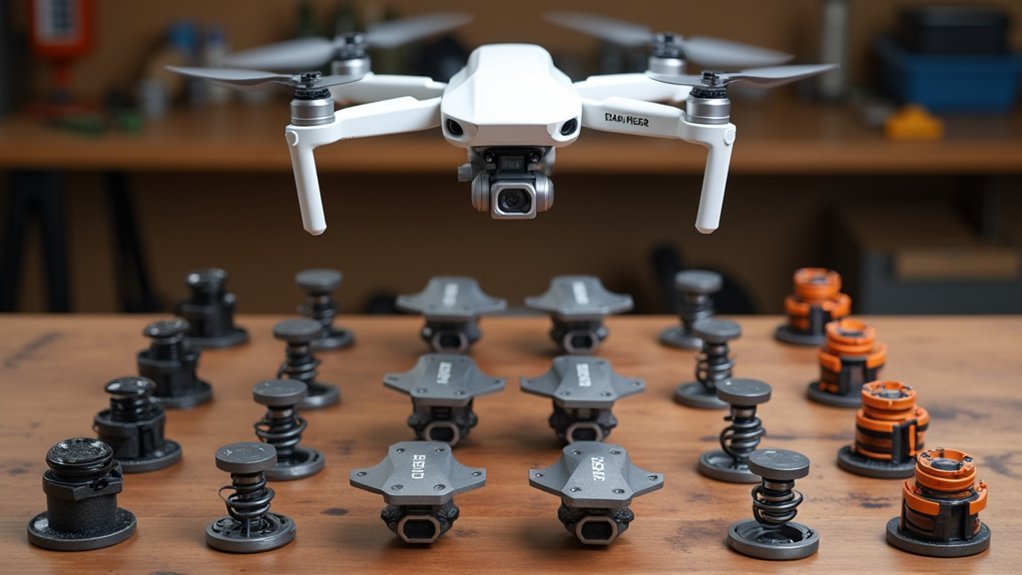You'll find selecting the right battery voltage checker can make a significant difference in your device maintenance routine. Whether you're testing household batteries or monitoring specialized equipment, today's market offers diverse options to match your needs. From basic testers to advanced digital monitors, each tool brings unique features to the table. Let's explore seven reliable voltage checkers that stand out for their accuracy, versatility, and user-friendly design.
Battery Tester Checker BT-168 for Multiple Battery Types
The BT-168 battery tester stands out as an essential tool for households managing multiple battery types, since it can check AA, AAA, C, D, 9V, and 1.5V button cells without needing its own power source.
You'll find its analog display intuitive, with clear indicators showing if your batteries are good (green), low (yellow), or need replacement (red). While it's not a precise capacity meter, it effectively helps you identify usable batteries, potentially saving you money. The tester's lightweight design makes it portable, though some users note it's tricky to test button cells. Despite minor durability concerns, you'll appreciate how this affordable device helps reduce battery waste and simplifies battery management.
Best For: Home users and electronics enthusiasts who need to regularly test multiple types of batteries and want to avoid unnecessarily discarding partially charged batteries.
Pros:
- Self-powered operation eliminates need for separate power source
- Clear, easy-to-read analog display with color-coded indicators
- Compatible with multiple battery types including AA, AAA, C, D, 9V, and button cells
Cons:
- Not designed for precise capacity measurements
- Lightweight construction raises durability concerns
- Difficult to properly position and test small button cell batteries
Dlyfull LCD Universal Battery Tester for Multiple Battery Types
Battery testing becomes effortless with Dlyfull's LCD Universal Battery Tester, making it ideal for households managing multiple battery types. You'll appreciate its compatibility with AA, AAA, C, D, 9V, and various button cell batteries, while the crisp LCD screen clearly shows if your batteries are in poor, weak, or good condition.
While it's not designed for rechargeable batteries, you'll find value in its compact size and anti-slip finish. The device comes ready to use with an AAA battery and includes an 18-month warranty. For basic voltage checking and quick battery assessment, it's a practical tool that'll help you save money and extend battery life.
Best For: Home users who need to quickly test multiple types of disposable batteries and want a simple, portable solution for battery management.
Pros:
- Compatible with a wide range of battery types including AA, AAA, C, D, 9V, and button cells
- Easy-to-read LCD display shows clear battery status indicators (poor, weak, good)
- Compact, portable design with anti-slip finish and comes ready to use with included battery
Cons:
- Not suitable for testing rechargeable batteries
- Lacks load testing capability for more thorough battery assessment
- Functions more as a basic voltmeter rather than a comprehensive battery health analyzer
MOTOPOWER Digital Car Battery Tester & Voltmeter (MP0514A)
DIY mechanics and car enthusiasts will appreciate MOTOPOWER's MP0514A digital tester for its straightforward operation and reliable voltage readings. The device's 4-20V DC testing range and LCD display deliver accuracy to 0.01V, making it ideal for monitoring your car's battery and alternator performance.
You'll find built-in safety features like reverse-hookup protection and a rubber-coated body for better grip. While the lightweight clamps could be more durable, you're getting solid value for a budget-friendly price. The tester's compact design and connect-and-go functionality make it perfect for quick battery checks across multiple vehicles, though you might want to pair it with a high-end multimeter for maximum precision.
Best For: DIY mechanics, car enthusiasts, and vehicle owners who want an affordable, easy-to-use tool for basic battery and alternator voltage testing.
Pros:
- Simple connect-and-go operation with clear LCD display
- Accurate voltage readings within 4-20V DC range
- Built-in safety features including reverse-hookup protection
Cons:
- Lightweight clamps may bend and lack durability
- No fuse for short-circuit protection
- Less precise than professional-grade multimeters
D-FantiX Battery Tester for AAA, AA, C, D & 9V Batteries (BT-168)
For home users seeking a straightforward battery testing solution, D-FantiX's BT-168 tester offers reliable status checks for common household batteries without requiring its own power source.
You'll find the analog display easy to read, with color-coded indicators showing whether your batteries are good (green), low (yellow), or need replacement (red). The device works with AA, AAA, C, D, 9V, 1.5V, and button cells. While you might encounter some difficulty positioning batteries between the prongs, the tester's compact size and money-saving benefits outweigh this minor drawback. It's a practical investment that'll help you avoid tossing out perfectly good batteries.
Best For: Households and individuals who frequently use multiple types of batteries and want an easy way to check battery life without spending much money.
Pros:
- Works without requiring its own power source
- Tests multiple battery types (AA, AAA, C, D, 9V, button cells)
- Clear color-coded display makes results easy to interpret
Cons:
- Can be tricky to position batteries correctly for testing
- Plastic construction may raise durability concerns
- No spring-loaded mechanism to secure batteries in place
AstroAI Digital Multimeter Tester 2000 (Voltage, Current & Resistance)
Savvy homeowners and automotive enthusiasts will appreciate the AstroAI Digital Multimeter Tester 2000's blend of functionality and user-friendly design. You'll get accurate readings for AC/DC voltage, DC current, and resistance through its backlit LCD display that samples twice per second.
The multimeter's double fuse protection and silicone cover keep you safe while testing, and convenient features like Data Hold and Auto Shutoff make your work easier. While you can't measure AC current or voltage below 100mV, you'll find this affordable tester perfect for checking batteries, fuses, and household circuits. The California-based support team responds within 24 hours if you need assistance.
Best For: DIY enthusiasts, homeowners, and automotive hobbyists seeking an affordable, reliable multimeter for basic electrical testing and diagnostics.
Pros:
- User-friendly design with intuitive controls and backlit display for easy reading in low light
- Comprehensive safety features including double fuse protection and shock-resistant silicone cover
- Excellent value for money with essential features like Data Hold and Auto Shutoff
Cons:
- Cannot measure AC current or voltage below 100mV
- Plastic construction feels less durable compared to professional-grade models
- Basic test leads may need upgrading and instruction manual could be more detailed
Battery Tester Checker for AAA AA C D 9V Batteries (2 Pack)
Battery management becomes effortless with the ZUFECY BT-168 battery tester checker, a pocket-sized tool that instantly reveals the health status of your household batteries. You'll appreciate its straightforward color-coded system: green for good, yellow for low, and red for replace/recharge.
At just 4 inches long and weighing less than an ounce, this ABS plastic tester fits easily in your pocket. You're getting excellent value with two testers in the package, both compatible with AAA, AA, C, D, 9V, and button cell batteries. With over 2,200 positive reviews and a 4.5-star rating, you'll join many satisfied users who've simplified their battery testing routine.
Best For: Households and professionals who frequently use multiple types of batteries and want a simple, portable way to check battery life and avoid wastage.
Pros:
- Universal compatibility with most common household battery types (AAA, AA, C, D, 9V, button cell)
- Compact and lightweight design makes it easily portable and storable
- Clear, color-coded system provides instant battery health readings
Cons:
- Delicate components require careful handling to avoid damage
- Some users report quality control issues
- Limited to basic battery health indication without detailed voltage readings
RC Cellmeter 7 Digital Battery Capacity Checker and Voltage Tester
RC hobbyists and technicians will appreciate the versatile RC Cellmeter 7, a digital capacity checker that accurately tests multiple battery types including LiPo, LiFe, Li-ion, NiMH, and NiCd cells.
This compact device displays essential metrics like total voltage, individual cell voltages, voltage gaps, and remaining battery capacity percentage with 0.001V precision. You'll find it compatible with 4-7 NiCd/NiMH cells and 2-7 lithium cells. At just 45g and measuring 8.4x5x1.6cm, it's perfectly portable.
The Cellmeter 7 comes with a user manual and features a 1A balance current. It's proven reliable and user-friendly for RC applications, though you'll need to supply your own battery.
Best For: RC hobbyists, drone enthusiasts, and electronics technicians who need accurate battery testing and monitoring capabilities for multiple battery types.
Pros:
- High precision voltage testing (0.001V) and comprehensive battery metrics display
- Compatible with multiple battery types (LiPo, LiFe, Li-ion, NiMH, NiCd) and cell configurations
- Compact, lightweight design (45g) makes it highly portable for field use
Cons:
- Battery not included for operation
- Limited to testing maximum of 7 cells
- Servo testing range may be restrictive for some specialized applications
Factors to Consider When Choosing Battery Voltage Checkers
When you're shopping for a battery voltage checker, you'll need to match your device with the specific battery types you use and guarantee the display offers clear, easy-to-read measurements. You should examine the checker's construction quality and verify it won't break after a few drops or regular use. Consider whether the device needs its own power source and check that it includes essential safety features like reverse polarity protection and overload prevention.
Battery Type Compatibility
Selecting the right voltage checker begins with understanding its compatibility across different battery types. You'll need to verify your checker can test common household batteries like AA, AAA, C, D, and 9V, along with various button cell formats you frequently use.
Consider whether you're working with standard alkaline batteries or specialized chemistries. If you use rechargeable batteries like NiMH or Li-ion, you'll want a tester specifically designed to handle these types, as they require different voltage measurements for accurate results. For battery packs with multiple cells, check that your tester can handle series or parallel configurations.
Look for testers that display clear battery health indicators, as voltage and performance characteristics vary greatly between different battery types. This feature helps you quickly determine when it's time for replacement.
Display and Reading Clarity
A battery voltage checker's display can make or break its effectiveness in daily use. You'll find two main display types: analog meters with color-coded scales and digital screens with numerical readouts. While analog displays offer quick visual feedback through green, yellow, and red zones, digital displays provide more precise measurements and additional data like remaining capacity percentages.
When choosing a display type, consider your lighting conditions. If you're working in dim environments, you'll want a backlit screen to guarantee clear visibility. The display's resolution is also vital – some testers show voltage readings to the nearest 0.001V, while others offer less precision. Your choice should match your needs; for general household use, basic readouts might suffice, but for professional applications, you'll benefit from higher resolution and more detailed information.
Durability and Build Quality
Since battery voltage checkers often face rough handling and frequent use, their durability and build quality directly impact their reliability and longevity. You'll want to prioritize models with rubberized coatings or silicone covers, as they provide better grip and protection against accidental drops.
Pay close attention to the quality of clips and probes – they're critical components that shouldn't bend or break during testing. Look for testers that incorporate safety features like reverse-hookup and over-voltage protection, which not only safeguard your device but also extend its lifespan. While lightweight designs might seem appealing for portability, be wary of checkers that feel too light, as this could indicate lower-quality materials. Instead, choose a tester with a balanced weight that suggests solid construction and durable components.
Power Source Requirements
Power source requirements play an essential role in the functionality and convenience of battery voltage checkers. You'll find that many modern checkers don't need their own power source, instead drawing minimal power from the battery being tested. This self-powered design makes them more practical and eliminates the need to maintain separate batteries for the device itself.
When choosing a voltage checker, you'll want to verify its compatibility with your battery types. Some models work only with specific batteries, which can limit their usefulness. If you frequently work with rechargeable batteries, make sure your chosen checker can accurately test them, as not all devices are designed for this purpose. Look for a model that balances power efficiency with clear display readability, ensuring you can easily read the results without straining your eyes.
Safety Features
While choosing a battery voltage checker, safety features should be your top priority to protect both you and your equipment. You'll want to select a model with reverse-hookup protection, which prevents damage if you accidentally connect the clamps incorrectly. Look for testers that include over-voltage protection to shield the device from harmful high voltage levels.
Double fuse protection is another vital feature you shouldn't overlook, as it helps prevent burns and electrical failures during short circuits. To enhance physical safety during use, choose a tester with a rugged, non-slip design that reduces the risk of accidental drops. Don't forget to take into account models that include a low battery indicator – this feature guarantees you'll know when it's time to replace or recharge your tester's power source for consistent, reliable testing.
Accuracy and Testing Speed
Beyond safety features, the performance of your battery voltage checker hinges on its accuracy and testing speed. You'll want to look for testers that provide precise readings, with some premium models offering accuracy up to 0.001V to help you reliably assess battery health.
Consider how quickly you need results, especially if you're testing multiple batteries. The best testers deliver readings within seconds of battery insertion. Your display preference matters too – you can choose between traditional analog displays or LCD screens for viewing measurements. Look for a device that includes load testing capabilities, as this feature reveals how batteries perform under real-world conditions. Additionally, verify your chosen tester can effectively detect low voltage levels, often indicated by "LO" readings, to help you identify failing batteries promptly.
Frequently Asked Questions
How Often Should I Calibrate My Battery Voltage Checker?
You'll want to calibrate your voltage checker every 6-12 months, depending on usage frequency. If you notice inconsistent readings or use it professionally, calibrate more often. Don't skip this maintenance for accurate results.
Can Battery Testers Drain Power From the Batteries Being Tested?
Yes, your battery tester will draw a small amount of power during testing. However, it's typically minimal and won't greatly impact battery life unless you're constantly testing the same batteries repeatedly.
What's the Typical Lifespan of a Battery Voltage Checker?
You can expect your battery voltage checker to last 5-10 years with proper care. It'll depend on usage frequency, storage conditions, and quality. Digital testers typically outlast analog ones due to fewer mechanical parts.
Are Battery Voltage Checkers Accurate in Extreme Temperatures?
You'll notice that extreme temperatures can affect voltage checker accuracy. Most units work best between 32-104°F (0-40°C). They're less reliable in very hot or cold conditions, so you should test at room temperature.
Can Testing Damaged Batteries Harm My Voltage Checker?
Yes, testing damaged batteries can harm your voltage checker. You shouldn't check batteries that are leaking, swollen, or physically damaged. These could short circuit your device or cause corrosive damage to its components.
In Summary
Choose your battery voltage checker based on your specific needs. You'll find options ranging from basic BT-168 models for household batteries to sophisticated RC Cellmeter 7 for specialty applications. Consider factors like display type, portability, and battery compatibility. Whether you're a casual user or electronics enthusiast, there's a tester that'll match your requirements and help you maintain your devices efficiently.

As educators and advocates for responsible drone use, we’re committed to sharing our knowledge and expertise with aspiring aerial photographers.




Leave a Reply